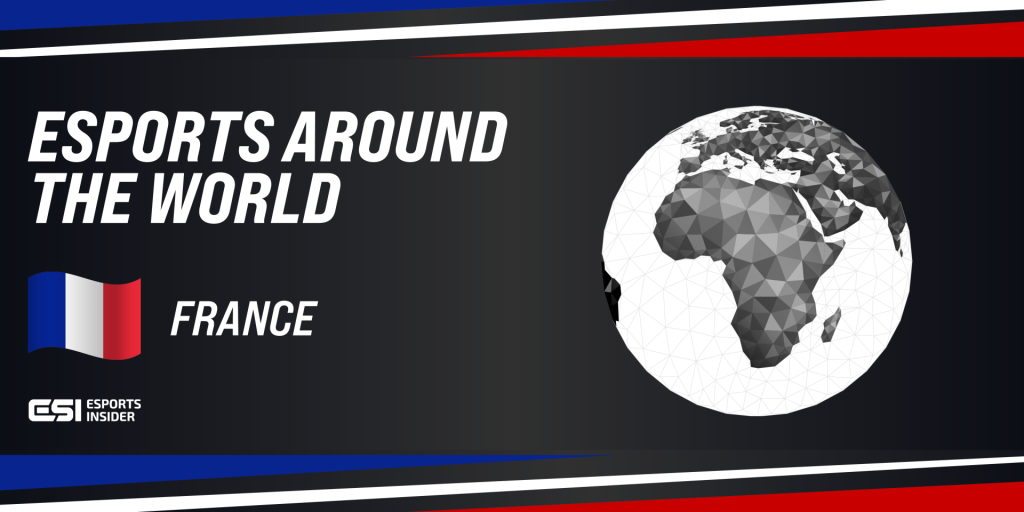Esports Around The World is a series of profiles outlining the esports ecosystem in various countries globally. The series ties into ESI’s international esports business events, which take place around the world.

Introduction
France has slowly become one of Europe’s most talked about countries when it comes to esports. French president Emmanuel Macron has publicly praised the esports industry and has stated that he wants esports to take part in the 2024 Paris Olympics – in some way, shape or form.
In recent years, the French scene has also developed a strong regional following, particularly within League of Legends and for teams such as Karmine Corp. In fact, the country’s regional League of Legends competition, the LFL, recorded over 220,000 peak viewers at one point during the Spring 2022 season. Rocket League also enjoys a very strong regional fanbase.
France has a long history of developing world-class players across a range of titles. Retired Dota 2 superstar Sébastien ‘Ceb’ Debs is the only French player to win The International, taking the title consecutively in 2018 and 2019 with OG. French Team Vitality CS:GO duo Dan ‘apEX’ Madesclaire and Mathieu ‘ZywOo’ Herbaut, among many other French players, have been highly regarded in the scene for years. Team Envy has also previously fielded very successful French rosters.
Given the country’s development structure within League of Legends, it’s no surprise to see the title have multiple rising talents in the scene. Vincent ‘Vetheo’ Berrié, Loïc ‘toucouille’ Dubois, Steven ‘Hans sama’ Liv and Jean ‘Jezu’ Massol have already started to make names for themselves in both Europe and North America. Moreover, players such as Bora ‘YellOwStaR’ Kim and Paul ‘sOAZ’ Boyer have attached themselves to European League of Legends history.
France also sees deep success in Rocket League, most notably through Team BDS and Team Vitality. Team BDS’ all-French roster won the RLCS 2021-22 World Championship, and Team Vitality are 22-23 reigning World Champions. More French players have Rocket League World Championship titles than any other country, as of the time of writing.
France’s competitive success across titles is clear, but the country is particularly known for its industry developments, too. The country is home to a growing and passionate fanbase, along with new structures being developed to bolster its scene. Trust Esport, the first esports-specific venture fund in France, was launched in 2018 with the purpose to invest in startups focusing on services that improve esports and gaming. The fund was founded by esports entrepreneur Matthieu Dallon, who co-founded esports platform Toornament.com, and also founded non-profit association France Esports alongside the French Ministry of Economy.
In May 2022, the French government banned government officials from using several gaming-related words imported from English — including esports, which must be ‘jeu video de competition’ — in a bid to preserve language purity.

Government recognition
France’s passion for esports is underpinned by some of the strongest government support for esports in Europe. French President Emmanuel Macron has also spoken highly and supportively of esports and France’s success within the discipline.
He has announced ambitions to bring major events from leading disciplines to France, and has personally met with French players. In September 2022, Macron himself announced the BLAST Paris Major, which took place early 2023. In June 2022, Macron invited French esports industry stakeholders to an event at the official Presidential palace.
In January 2023, the French government revealed plans for a National Esports Strategy, which would include support for esports visas for players and talent, grassroots esports support and a better structured esports ecosystem.
France has made some effort at regulation, too. The French Digital Republic Law of 2016 added certain regulations around esports events, such as differentiating physically-held esports tournaments from gambling, and clarifying the labour status of professional players.
Additionally, as of January 1st 2024, the French government updated the VAT tax rate from 20% to 5.5% for esports event ticket sales.
Back in June 2018, Team Vitality signed an agreement with the government-supported National Institute of Sport, Expertise, and Performance (Insep) to help training and development of French esports players.

Notable Tournaments & Leagues
France has a notably successful domestic League of Legends league, the LFL, and has also hosted major S-tier events like the League of Legends World Championship 2019.
| BLAST Paris Major | La Ligue Française (LFL) |
| eLigue1 | Six Invitational 2021 |
| League of Legends World Championship 2019 | VRL France: Revolution |

Notable Esports Organisations
Note that this is a non-exhaustive list and exclusion does not signify an org is not notable.
| GentleMates | Solary |
| Karmine Corp | Team Go (previously GamersOrigin) |
| Mandatory | Team Vitality |
| PSG Esports |

National Association(s) / Federation(s)
Note that inclusion in this list does not suggest any acknowledgement from ESI of its authority, works or official capacity.
| France Esports |
| Fédération Française de Jeu Vidéo (FFJV) (French Federation of Video Games) |

Education intiatives
In August 2020, Team Vitality launched Vitality School to provide online esports training courses for 12-17-year-olds during the school holidays.
In 2023 tournament organiser ArmaTeam, the Versaille education authority Académie de Versailles and the Institute of Sports-Health Sciences of Paris won an award for innovation in school for their ‘Educ Esports’ project. The five-year project, which received a €2m (~£1.72m) grant, explores various opportunities for leveraging esports in an educational capacity.
This is a preliminary country profile and will be augmented with additional information over time. If you have any suggestions or feedback for this profile, please get in touch at info@esportsinsider.com. Article originally published: August 26th 2022. Article last updated: September 8th 2023.
UPDATE 11/09/2023: This article originally incorrectly stated in the Government Recognition section that the French Digital Republic Law had officially recognised esports as a national sport.
